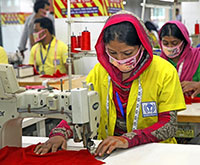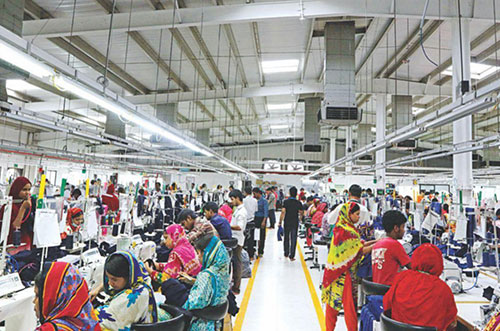"Though the Bangladesh RMG sector witnessed insignificant growth during the fiscal years 2016-17 and 2017-18, growth rate picked up the following year owing to Taka’s depreciation and a rise in exports to the United States. However, now the country’s major export-earning industry faces a number of challenges."
 Though the Bangladesh RMG sector witnessed insignificant growth during the fiscal years 2016-17 and 2017-18, growth rate picked up the following year owing to Taka’s depreciation and a rise in exports to the United States. However, now the country’s major export-earning industry faces a number of challenges.
Though the Bangladesh RMG sector witnessed insignificant growth during the fiscal years 2016-17 and 2017-18, growth rate picked up the following year owing to Taka’s depreciation and a rise in exports to the United States. However, now the country’s major export-earning industry faces a number of challenges.
One major challenge is the weaning off of preferential trade benefits like Generalised System of Preferences (GSP) once it graduates as a middle-income country. This will lead to loss in cost competitiveness that can be detrimental for the apparel sector. Another challenge is the evasion of low value-low margin market segment that produces volume-driven products.
Sub-contracting hinders development of high-end products
The sector also lacks the capacity to produce products with higher ticket prices as sub-contracting is a big issue in the industry. Apparel companies currently in operation need assistance to develop their organisational and human resources skills. Still, the country has been able to change foreign buyer’s perception about the sector mainly on account of the pressure exerted by the Accord and Alliance Bangladesh.
in the industry. Apparel companies currently in operation need assistance to develop their organisational and human resources skills. Still, the country has been able to change foreign buyer’s perception about the sector mainly on account of the pressure exerted by the Accord and Alliance Bangladesh.
However, compliance interfere with profit margins of these companies as small and medium enterprises (SMEs) often fail to comply with labor laws and buyers' codes of conduct. They fail to send shipments on time and suffer from liquidity crisis and thus are unable to pay worker's wages timely. Therefore, they the face risk of losing business. Consequently, there will be a rise in unemployment rates.
Creating export-oriented sector for employment generation
On the other hand, as large factories meet compliance requirements, workers who lose their jobs on account of shutting down of inefficient factories may attain employment in large factories. However, majority of workers still stand to lose their jobs. To prevent this, Bangladesh needs to ensure inclusive development and create export-oriented sectors, in order to generate quality jobs.
The RMG sector also needs to balance setting up of minimum wages with maintaining the sector’s competitiveness. As a consequence, some factories have opted for automation to reduce their dependency on labour. Automation will have adverse effects on workers employed in the RMG industry.
Despite these challenges, the RMG sector has set a target of $50 billion exports by 2021. This target can be reached if the country focuses on inclusive growth by introducing a strong wage policy and making timely adjustments to minimum wages prior to consultation.












